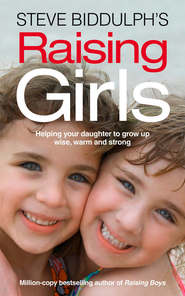По всем вопросам обращайтесь на: info@litportal.ru
(©) 2003-2024.
✖
The Complete Parenting Collection
Автор
Год написания книги
2018
Настройки чтения
Размер шрифта
Высота строк
Поля
4. Lighten up. Enjoy your kids. Being with them out of guilt or obligation is second-rate – they sense you are not really there in spirit. Experiment to find those activities that you both enjoy. Take the ‘pressure to achieve’ off your kids: when you play a sport or game, don’t get into too much heavy coaching or competition. Remember to laugh and muck about. Only enrol them in one, or at most two organised sports or activities, so they have time to just ‘be’. Reduce ‘racing-around’ time, and devote it instead to walks, games and conversations. Avoid over-competitiveness in any activity beyond what is good fun. Teach your kids, continuously, everything you know.
5. Heavy down. Some fathers today are lightweight ‘good-time’ dads who leave all the hard stuff to their partners. After a while of this, these partners start to say, ‘I have three kids, and one of them is my husband’. There is an unmistakable indicator for this – when your sex life declines badly!
Get involved in the decisions and discussions in the kitchen, help to supervise homework and housework. Develop ways of discipline that are calm but definite. Don’t hit – although with young children you may have to gently hold and restrain them from time to time. Don’t shout if you can help it. Aim to be the person who stays calm, keeps things on track, and pushes the discussion on about how to solve behaviour problems. You are in charge through your clarity, focus and experience, not through being bigger and meaner. Do listen to your kids, and take their feelings into account. You are on a gradient, from being totally in charge of a baby or toddler, through to being on an equal footing with a 21-year-old who pays for dinner.
Talk with your partner about the big picture: ‘How are we going overall? What changes are needed?’ Parenting as a team can add a new bond between you and your partner. Check with your partner if you are stuck or don’t know how to react. You don’t have to have all the answers – no-one does. Parenthood is about making mistakes, fixing them, and moving right along.
In short
All through the primary school years and into early secondary school, boys should spend a lot of time with their fathers and mothers, gaining their help, learning how to do things, and enjoying their company. From an emotional viewpoint, the father is now more significant. The boy is ready to learn from his dad, and listens to what he has to say. Often he will take more notice of his father. It’s enough to drive a mother wild!
This window of time – from about age six to the fourteenth birthday – is the major opportunity for a father to have an influence on (and build the foundations of masculinity in) his son. Now is the time to ‘make time’. Little things count: playing in the backyard on summer evenings; going for walks and talking about life and telling him about your own childhood; working on hobbies or sports together, just for the enjoyment of doing it. This is when good memories are laid down, which will nourish your son, and you, for decades to come.
Don’t be deterred if your son acts ‘cool’, as he has learnt to do this from his schoolmates. Persist and you will find a laughing, playful boy just under the surface. Enjoy this time when he really is wanting to be with you. By mid-adolescence his interests will pull him more and more into the wider world beyond. All I can do here is plead with you – don’t leave it too late!
PRACTICAL HELP
WHEN BOYS ARE SHORT
Parents sometimes worry if their son is not growing as tall as other boys. Indications are that this worry is needless. A study of 180 boys aged eight to fourteen found that short children are no more likely to be maladjusted than taller children.
Earlier research suggested shorter youngsters were more likely to be shy, anxious or depressed, but times have changed, and more recent studies have not found this to be so. If a child is praised and valued, and has good communication within the family, then being different will cause much less stress.
In the study, short boys described themselves as less socially active, but did not have more behaviour problems than boys of average height. Girls in the study often had even better mental health than girls of normal height. Children whose parents were short themselves seemed to have far fewer problems, probably because of the good role-modelling being provided by their parents. These parents were less likely to be worried or seek medical help for shortness.
In the US, 20 000 children have taken human growth hormone to overcome shortness, a treatment costing tens of thousands of dollars. But doctors recommend the hormone treatment only when it is medically necessary, such as when kidney failure or other conditions have caused a deficiency in the growth hormone. Paediatricians do not believe that psychological reasons are sufficient to justify the treatment, which is painful, inconvenient, and can do more harm than good.
Fourteen and onwards: becoming a man
At around fourteen years of age a new stage begins. Usually by now a boy is growing fast, and a remarkable thing is happening on the inside – his testosterone levels have increased by almost 800 percent over his pre-puberty amount!
Although every boy is different, it’s common for boys at this age to get a little argumentative, restless and moody. It’s not that they are turning bad – it’s just that they are being born into a new self, and any type of birth always involves some struggle. They are needing to find answers to big questions, to begin new adventures and challenges, and to learn competencies for living – and their body clock is urging them on.
I believe this is the age when we fail kids the most. In our society, all we offer the midteens is ‘more of the same’: more school, more of the routines of home. But the adolescent is hungry for something else, something new. He is hormonally and physically ready to break out into an adult role, but we want him to wait another four or five years! It’s little wonder that problems arise.
What’s needed is something that will engage the spirit of a boy – that will pull him headlong into some creative effort or passion that gives his life wings. All the things that parents have nightmares about (adolescent risk-taking, alcohol, drugs, unsafe sex and criminal activity) happen because we do not find channels for young men’s desire for glory and heroic roles. Boys look at the larger society and see little to believe in or join in with. Even their rebellion is packaged up and sold back to them by advertisers and the music industry.
They want to jump somewhere better and higher, but that place is nowhere in sight.
STORIES FROM THE HEART
A LAKOTA INITIATION
The Native American people known as the Lakota were a vigorous and successful society, characterised by especially equal relationships between men and women.
At around the age of fourteen, Lakota boys were sent on a ‘vision quest’, or initiation test. This involved sitting and fasting on a mountain peak to await a vision or hallucination brought on by hunger. This vision would include a being who would bring messages from the spirit world to guide the boy’s life. As the boy sat alone on the peak, he would hear mountain lions snarl and move in the darkness below him. In fact the sounds were made by the men of the tribe, keeping watch to ensure the boy’s safety. A young person was too precious to the Lakota to endanger needlessly.
Eventually, when the young man returned to the tribe, his achievement was celebrated. But from that day, for two whole years, he was not permitted to speak directly to his mother.
Lakota mothers, like the women of all hunter-gatherer groups, are very close and affectionate with their children, and the children often sleep alongside them in the women’s huts and tents. The Lakota believed that if the boy spoke to his mother immediately following his entry into manhood, the pull back into boyhood would be so great that he would ‘fall’ back into the world of women and never grow up.
After the two years had passed, a ceremonial rejoining of the mother and son took place, but by this time he was a man and able to relate to her as such. The reward that Lakota mothers gained from this ‘letting go’ is that they were assured their sons would return as respectful and close adult friends.
What old societies did
In every society before ours – from the tropics to the poles – in every time and place that has been studied by anthropologists, mid-teen boys received a burst of intensive care and attention from the whole community. This was a universal human activity, so it must have been important. These cultures knew something we are still learning – that parents cannot raise teenage boys without getting the help of other adults.
One reason for this is that fourteen-year-old sons and their fathers drive each other crazy. Often it’s all a father can manage to love his son. Trying to do this and teach him can be just impossible. (Remember your dad teaching you to drive?) Somehow the two males just get their horns tangled and make each other worse. Fathers get too intense: they feel they are running out of time as a dad, and they see their own mistakes being repeated.
Once, when I was an inexperienced family therapist, we saw a family whose fourteen-year-old teenage son had run away and lived in the railway yards for several days. He was found, but it scared everyone, and the family felt they needed to get help. Talking to them, we discovered a remarkable thing. Sean was their youngest son, but he wasn’t the first to do this running away thing! Each of their three sons had ‘done a runner’ around this age. My boss, a wise and scarily intuitive man, looked the father straight in the eye. ‘Where did you go when you were fourteen?’ The father pretended not to understand but, with his entire family looking accusingly on at him, grinned foolishly and spilled the beans. He had been a teenage runaway at fourteen after huge fights with his dad. He’d never told his wife about this, let alone his kids. Without knowing it, though, he had become increasingly impossible, uptight and picky as his own sons reached that age. Effectively, unconsciously, he drove them to run away. Luckily, the family tradition called for coming home again, safe and sound.
So fathers and fourteen-year-old sons can get a bit tense with each other. If someone else can assist with the male role at this age, then dads and sons can relax a little. (Some wonderful movies have been based on this – look in your DVD rental store for Searching for Bobby Fisher, Finding Forrester and The Run of the Country.)
Traditionally, two things were done to help young men into adulthood. First, they were ‘taken on’ and mentored into adulthood by one or more men who cared about them and taught them important skills for living. And second, at certain stages of this mentoring process, the young men were taken away by the community of older men and initiated. This meant being put through some serious growing-up processes, including testing, sacred teaching and new responsibilities. We’ll come back to this in the final chapter, on community.
We can contrast the Lakota experience with many modern-day sons and their mothers, who (according to writers like Babette Smith in Mothers and Sons) often remain in an awkward, distant or rather infantile relationship for life. These sons fear getting too close, and yet, being uninitiated as men, they never really escape. Instead, they relate to all women in a dependent and immature way. Not having entered the community of men, they are distrustful of other men and have few real friends. They are afraid of commitment to women because for them it means being mothered, and that means being controlled. They are real ‘nowhere men’.
It’s only by leaving the world of women that young men can break the mother-mould and relate to women as fellow adults. Domestic violence, unfaithfulness and the inability to make a marriage work may result not from any problem with women but from men’s failure to take boys on this transforming journey.
STORIES FROM THE HEART
THE STORY OF NAT, STAN AND THE MOTORBIKE
Nat was fifteen, and his life was not going well. He had always hated school and found writing difficult, and things were just mounting up. The school he went to was a caring school, and his parents, the counsellor and the principal knew each other and could talk comfortably. They met and decided that if Nat could find a job, they would arrange an exemption. Perhaps he was one of those boys who would be happier in the adult world than the in-between world of high school.
Luckily Nat scored a job in a one-man pizza shop – ‘Stan’s Pizza’ – and left school. Stan, who was about thirty-five, was doing a good trade and needed help. Nat went to work there and loved it: his voice deepened, he stood taller, his bank balance grew. His parents, though, began to worry for a new reason. Nat planned to buy a motorbike – a big bike – to get to work. Their home was up a winding, slippery road in the mountains. They watched in horror as his savings got closer to the price of the motorcycle. They suggested a car, to no avail. Time passed.
One day Nat came home and, in the way of teenage boys, muttered something sideways as he walked past the dinner table. Something about a car. They asked him to repeat it, not sure if they should. ‘Oh, I’m not going to get a bike. I was talking to Stan. Stan reckons a bloke’d be an idiot to buy a motorbike living up here. He reckons I should wait an’ get a car.’
‘Thank God for Stan!’ thought his parents, but outwardly they just smiled and went on eating their meal.
You might think that (in the old societies) the boys’ mothers, and perhaps the fathers too, would resent or fear their son being ‘taken over’ by others. But this was not the case. The initiators were men they had known and trusted all their lives. The women understood and welcomed this help, because they sensed the need for it. They were giving up a rather troublesome boy and getting back a more mature and integrated young man. And they were probably very proud of him.
The initiation into adulthood was not a one-off ‘weekend special’. It could involve months of teaching about how to behave as a man, what responsibilities men took on, and where to find strength and direction. The ceremonies we normally hear about were only the marker events. Sometimes these ceremonies were harsh and frightening (and we would not want to return to these) but they were done with purpose and care, and were spoken of with great appreciation by those who had passed through them.
Traditional societies depended for their survival on raising competent and responsible young men. It was a life-and-death issue, never left to chance. They developed very proactive programs for doing this, and the process involved the whole adult community in a concerted effort. (Some innovative ways we might go about this, appropriate to our times, are described in the final chapter, ‘A community challenge’.)
In the modern world
Mentoring today is mostly unplanned and piecemeal, and lots of young men don’t receive any mentoring at all. Those doing the mentoring – sports coaches, uncles, teachers and bosses – rarely understand their role, and may do it badly. Mentoring used to happen in the workplace, especially under the apprenticeship system, whereby a young man learnt a great deal about attitudes and responsibilities along with his trade skills. This has all but disappeared – you won’t get much mentoring while stacking shelves at the local supermarket.
Enlisting the help of others
The years from fourteen until the early twenties are for moving into the adult world, for separating from parents. Parents carefully and watchfully ease back. This is the time when a son develops a life which is quite separate from the family. He has teachers you barely know, experiences you never hear about, and he faces challenges that you cannot help him with. Pretty scary stuff.
A fourteen- or sixteen-year-old is far from ready to just be ‘out there’. There have to be others to act as a bridge, and this is what mentors do. We should not leave youngsters in a peer group at this age without adult care. But a mentor is more than a teacher or a coach: a mentor is special to the child and the child is special to him. A sixteen-year-old will not always listen to his parents – his inclination is not to. But a mentor is different. This is the time for the youngster to make his ‘glorious mistakes’, and part of the mentor’s job is to make sure the mistakes are not fatal.
Parents have to ensure that mentoring happens – and they should have a big hand in choosing who does it. It really helps to belong to a strong social group – an active church, a family- minded sport, a community-oriented school, or a group of friends who really care about each other.











